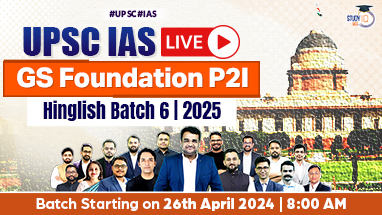StudyIQ is India’s no. 1 Website for UPSC, State PSC and Judiciary examination preparation. We bring the best of the resources for UPSC, State PSC and Judiciary for our aspirants. Information Starting from UPSC Notification 2024, Admit cards, UPSC Result 2024, UPSC Syllabus, Salary, previous year paper and Preparation Strategies, Live classes, Subject wise Notes, Daily MCQs, and Books & UPSC Online Coaching are available. These exams and jobs are regularly updated as per the official notification announced.
Trending Posts
- First IAS Officer of India Satyendranath Tagore
- BPSC Post List 2024, Check out Salary Wise Post
- CSIR SO ASO Result 2024 Expected Soon, Check CASE Merit list
- UPSC Syllabus 2024 – IAS Prelims and Mains Syllabus PDF
- World Malaria Day 2024, Obsereved annually on 25th April
- Current Affairs 24th April 2024 for UPSC Prelims Exam
- TNPSC Exam Calendar 2024, Check Exam Dates
- Fundamental Rights of Indian Constitution Articles12-35
- Llama 3, Most Sophisticated LLM AI Model Introduced by Meta
- New Tax Regime vs Old Tax Regime, Comparative Analysis
- MPPSC Exam Date 2024, Check Prelims Exam Date
- Union Territories of India with Capital List and History
- Difference between IAS and IPS, Check Salary and Higher Post
- JPSC Prelims Result 2024 Announced, Check Cut Off and Merit List
- Current Affairs 23rd April 2024 for UPSC Prelims Exam
- Drug Discovery Process, Research Initiatives in India
- Criminalisation of Politics and its Impact
- Space Tourism, Features, Ongoing Projects and Challenges
- Household Savings, Concerns About Rising Household Debt
- UPSC Final Result 2024 Released, Download Merit list PDF
Latest News
- Current Affairs 18th April 2024 for UPSC Prelims Exam
- Current Affairs 17th April 2024 for UPSC Prelims Exam
- Current Affairs 16th April 2024 for UPSC Prelims Exam
- Current Affairs 15th April 2024 for UPSC Prelims Exam
- Current Affairs 13th April 2024 for UPSC Prelims Exam
- Current Affairs 12th April 2024 for UPSC Prelims Exam
History
- Rowlatt Act 1919, Meaning, Provisions, Rowlatt Satyagraha
- Jallianwala Bagh Massacre, Date, History, Causes, Effects
- Civil Disobedience Movement, Causes, Impacts, Limitations
- Vaikom Satyagraha Started 100 Years Ago, Background and Aftermath
- Freedom Fighters of India List 1857-1947, Names, Contribution
- Mughal Empire List (1526 -1857), Timeline Order with Years
Geography
- Mount Etna’s Volcanic Vortex Rings
- Natural Resources, Definition, Types, Examples & Importance
- Components of Environment, Biotic and Aibotic Components
- Solar Eclipse 2024, Meaning, Types, Date and Time
- Taiwan Earthquake, Magnitude, Causes and Impact
- What is Kallakkadal Coastal Flooding: Cause and Mechanism
Indian Polity
- Fundamental Rights of Indian Constitution Articles12-35
- Union Territories of India with Capital List and History
- Lok Sabha Election 2024, Starts Form 19 April in 7 Phases
- BR Ambedkar Birth Anniversary, Biography, Legacy, Contribution
- Gorkhaland Territorial Administration (GTA), Power, Significance
- Prevention of Money Laundering Act 2002 (PMLA), Objectives, Amendments
Environment
- Dubai Flood, Factors and Climate Change Implications
- Aviation Emissions, Metrics, Historical Changes
- Microplastics, Types, Efforts to Combat Microplastics
- Green Hydrogen Fuel, Types, Benefits and Challenges
- Right Against Adverse Effects Of Climate Change
- Appiko Movement History, Background Objective and Result
Economy
- New Tax Regime vs Old Tax Regime, Comparative Analysis
- Why has India allowed FIIs to Invest in its Sovereign Green Bonds (SGrBs)?
- Wholesale Price Index (WPI) Latest Data in 2024
- India Mauritius Double Taxation Avoidance Agreement (DTAA)
- Unemployment Rate in India, Current Rate is 8% February 2024
- Food Inflation in India, Current Situation, International Prices
Biography
- Jyotiba Phule Biography, Facts and Social Reforms
- Mangal Pandey Biography, History and Role in Revolt of 1857
- Bhagat Singh Jayanti, Biography, History, Revolutionary Activities
- Lala Lajpat Rai Biography, Information, Legacy and Death
- Infosys Narayana Murthy, Biography, Career and Philanthropy
- Sarojini Naidu Biography, Awards, Achievements and History
UPSC Exam Preparation Website 2024
The objective of the StudyIQ is to provide each and every student across the country with affordable resources that can help them in their preparation for UPSC, State PSC and Judiciary exams.
StudyIQ covers all the recruitment information from the start till the end. After the release of the notification of the exam, we cover the detailed information that a candidate wants to know about particular recruitment such as the notification, important exam dates, the vacancy details, eligibility criteria, the exam pattern, the syllabus, and educational qualifications. We also provide you with a direct link to download the notification PDF directly and steps to download or apply for the particular examination from the respective official website.
StudyIQ provided appropriate study material with the test series, book kit, mock test, previous years’ question papers with solutions, cut off, and daily MCQs. We provide you with vast knowledge of all subjects required for examination, section-wise knowledge, and also videos on the daily relevant current affairs topics on our StudyIQ YouTube platform.
Our test series, daily study notes/PDF, and mock tests help candidates to prepare themselves on a daily basis for the UPSC, State PSC and Judiciary examinations. This will help candidates in increasing their speed and Accuracy without going to any of the big cities for preparation. Candidates can attempt proper section-wise mock tests for all topics at their home comfort zone. We also provide daily MCQs for a particular topic of the subject.
As we see there are ample amounts of study materials available in the market that sometimes dilute the focus of the candidates from the focused area. So, the StudyIQ team provides you with all relevant information to you in one place in a systematic way that can help you to figure out the strategy and planning to complete their syllabus in a timely manner.
Best Website for UPSC CSE Exam Preparation 2024
The Union Public Service Commission conducts the UPSC CSE exam every year for the recruitment of various vacancies for the various posts of Group A and Group B under the central government. UPSC CSE 2024 is the biggest and most prestigious government examination. StudyIQ provides you with detailed information regarding the notification, exam pattern, eligibility criteria, important dates and syllabus, and Results.
Best UPSC Website FAQs
Q. How do I start my UPSC preparation?
Ans. Candidates can start their UPSC preparation from the StudyIQ platform in a systematic way where you can find Daily Current Affairs, Burning Issues, Hindu Analysis, PIB Analysis and many more.
Q. How to cover current affairs when the IAS preparation syllabus is so vast?
Ans. Current Affairs for the IAS preparation is a very important part for which you can refer the StudyIQ’s Daily Current Affairs news Analysis and monthly magazine.
Q. Is self-preparation for the IAS exam enough to clear it?
Ans. Self-preparation for the IAS exam is a good choice but you need to start preparation in an organized manner with relevant study materials and proper strategy for which the StudyIQ platform can play an important role to provide all the UPSC-related materials and guidance at a place.
Q. Where to download UPSC study materials/IAS study material PDF?
Ans. Candidates can easily download UPSC study materials/IAS study material PDFs from India’s best UPSC platform StudyIQ.
Q. What are the Study Materials for GS preparation for IAS?
Ans. The Study Materials for GS preparation for the IAS exam include mainly NCERT from classes 6th to 12th, Daily Current Affairs & News analysis integrate with the static part and also refer to StudyIQ’s reference books such as Indian Geography, Indian Polity, Indian Economy, Indian Art & Culture and Fundamentals of Geography.
Q. Which website is best for the UPSC IAS exam preparation?
Ans. StudyIQ is the best platform for every aspect of the UPSC IAS exam preparation from scratch.


















